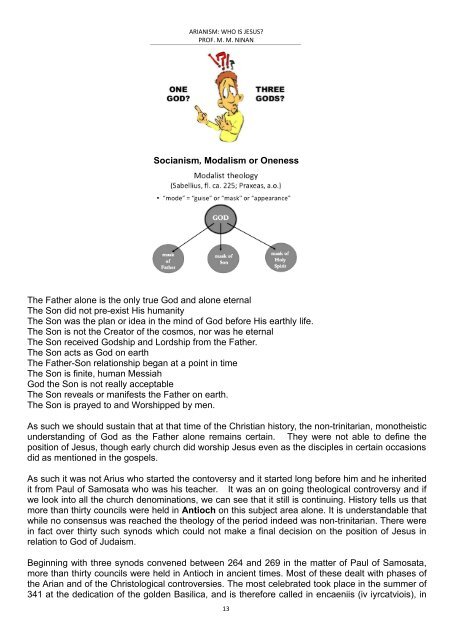Arius
You also want an ePaper? Increase the reach of your titles
YUMPU automatically turns print PDFs into web optimized ePapers that Google loves.
ARIANISM: WHO IS JESUS?<br />
PROF. M. M. NINAN<br />
Socianism, Modalism or Oneness<br />
The Father alone is the only true God and alone eternal<br />
The Son did not pre-exist His humanity<br />
The Son was the plan or idea in the mind of God before His earthly life.<br />
The Son is not the Creator of the cosmos, nor was he eternal<br />
The Son received Godship and Lordship from the Father.<br />
The Son acts as God on earth<br />
The Father-Son relationship began at a point in time<br />
The Son is finite, human Messiah<br />
God the Son is not really acceptable<br />
The Son reveals or manifests the Father on earth.<br />
The Son is prayed to and Worshipped by men.<br />
As such we should sustain that at that time of the Christian history, the non-trinitarian, monotheistic<br />
understanding of God as the Father alone remains certain. They were not able to define the<br />
position of Jesus, though early church did worship Jesus even as the disciples in certain occasions<br />
did as mentioned in the gospels.<br />
As such it was not <strong>Arius</strong> who started the contoversy and it started long before him and he inherited<br />
it from Paul of Samosata who was his teacher. It was an on going theological controversy and if<br />
we look into all the church denominations, we can see that it still is continuing. History tells us that<br />
more than thirty councils were held in Antioch on this subject area alone. It is understandable that<br />
while no consensus was reached the theology of the period indeed was non-trinitarian. There were<br />
in fact over thirty such synods which could not make a final decision on the position of Jesus in<br />
relation to God of Judaism.<br />
Beginning with three synods convened between 264 and 269 in the matter of Paul of Samosata,<br />
more than thirty councils were held in Antioch in ancient times. Most of these dealt with phases of<br />
the Arian and of the Christological controversies. The most celebrated took place in the summer of<br />
341 at the dedication of the golden Basilica, and is therefore called in encaeniis (iv iyrcatviois), in<br />
13

















